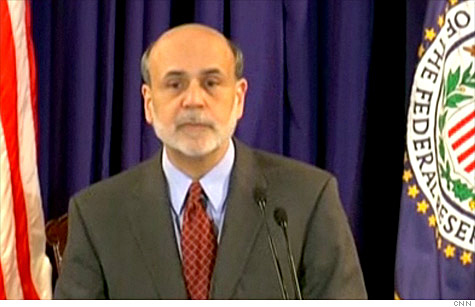Search News

Economists hope Fed Chairman Ben Bernanke will stand pat when he speaks in Jackson Hole, Wy., on Friday.
NEW YORK (CNNMoney) -- Economists aren't looking for Federal Reserve Chairman Ben Bernanke to announce some new plan to rescue the struggling U.S. economy in a much-anticipated speech this Friday.
In fact, most will be happy if Bernanke and the Fed decide to stand pat, despite growing fears about the risks of a double dip recession.
According to a survey of 16 leading economists by CNNMoney, 12 said they believe Bernanke is not about to signal some change in monetary policy, despite some market expectations that he will do so.
And a similar majority believes the Fed should not take any immediate steps to try to jumpstart the economy, even though it is dogged by sluggish hiring, weak spending and a falling stock market.
Economists are generally unified in their opposition to additional asset purchases by the central bank, a controversial strategy known as quantitative easing or QE for short.
Bernanke is speaking at the Kansas City Fed's annual economics confab in Jackson Hole, Wyo. Last year Bernanke used his speech there to lay the groundwork for a second round of purchases of Treasuries, or QE2.
Since stocks enjoyed a strong and extended rally after that speech, many investors are hoping he'll signal QE3 is on the way this Friday. But that enthusiasm isn't shared by economists.
"It's premature, and the potential costs exceed by a wide margin the possible benefits," said Patrick O'Keefe, director of economic research for accounting firm J.H. Cohn.
O'Keefe said with interest rates already near record lows and the Fed's balance sheet bloated by previous efforts to help the economy, "further action would be equivalent to serving ice cream cake as the main entree at a weight loss clinic."
There are a few ideas floated by economists for other steps the Fed could take. One is to lower the interest rates that the central bank pays on excess bank reserves, which would give bankers more incentive to lend out money rather than collect the low but safe returns guaranteed by the Fed.
Several others voiced support for the Fed rotating out of short-term Treasuries and into long-term government debt, a policy known as "Operation Twist" in economic circles.
But some economists said sparking growth is a job for Congress, not the Fed. Those in favor of fiscal stimulus from lawmakers said Bernanke should continue to voice support for such action in his remarks Friday.
However, efforts by the Fed to buy additional Treasuries in order to further cut the cost of borrowing doesn't get much support from economists.
"Fiscal imbalances in the U.S. and Europe need to be addressed, while consumer and business confidence needs to be restored," said Lynn Reaser, chief economist at the Fermanian Business & Economic Institute.
Economists said there are plenty of risks if the Fed goes on another asset buying binge. It would force more money into the global economy, which some believe would drive up the costs of commodities such as oil and food, increasing costs for consumers and greatly limiting any benefits to the economy.
But Bernanke and other defenders of QE2 deny inflation earlier this year was a result of the $600 billion in Treasury purchases.
Beyond the economic risks, others are worried about the costs to the Fed's reputation if it decided to pump more money into economy, especially since three district bank presidents already voted against the Fed specifically saying it wants to keep rates low until mid-2013.
Politicians, most notably Republican Presidential Rick Perry, are taking shots at Bernanke as well.
"More asset purchases equals more dissent, more political heat, more criticism from other economists, but not much real economic impact," said Robert Brusca of FAO Economics.
Still, some economists would like to see Bernanke risk that political backlash and signal that the Fed is ready to start buying assets again.
"Additional asset purchases will lower long-term interest rates, support stock prices, and buoy confidence," said Mark Zandi, chief economist of Moody's Analytics. "Asset purchases aren't a slam dunk positive for the economy, but they are still very much a net positive." ![]()
| Overnight Avg Rate | Latest | Change | Last Week |
|---|---|---|---|
| 30 yr fixed | 3.80% | 3.88% | |
| 15 yr fixed | 3.20% | 3.23% | |
| 5/1 ARM | 3.84% | 3.88% | |
| 30 yr refi | 3.82% | 3.93% | |
| 15 yr refi | 3.20% | 3.23% |
Today's featured rates:
| Latest Report | Next Update |
|---|---|
| Home prices | Aug 28 |
| Consumer confidence | Aug 28 |
| GDP | Aug 29 |
| Manufacturing (ISM) | Sept 4 |
| Jobs | Sept 7 |
| Inflation (CPI) | Sept 14 |
| Retail sales | Sept 14 |